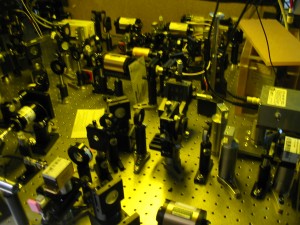I was catching up on StartupBus, an awesome (crazy? probably both) project that I really wish I could take part in. One part was watching the videos they shared in Youtube, especially one series by Phil McKinney (Chief Technology Officer at HP), where among other things he talks about the Rules of the Garage (the garage where HP was started). It is very inspiring I think those rules should apply not just in business but many other creative team effort. Such creative team effort is, for example, a physics lab, just like the one I’m working now. And indeed this group would need some philosophy infusion like this.
- Believe you can change the world.
- Work quickly, keep the tools unlocked, work whenever.
- Know when to work alone and when to work together.
- Share tools, ideas. Trust your colleagues.
- No Politics. No bureaucracy. (These are ridiculous in a [lab]).
- The customer defines a job well done. [?]
- Radical ideas are not bad ideas.
- Invent different ways of working.
- Make a contribution every day.
- If it doesn’t contribute, it doesn’t leave the [lab].
- Believe that together we can do anything.
- Invent.
These are so well formulated that they give more of an “aha!” feeling instead of a question that “yeah? why’s that?”. Researchers should have all of this drilled in. Or rather everyone should have.
The only one that I’m not satisfied by is #6: what constitutes a “job well done” in academia? No customers so no direct measurable response to the effort. The commonly used metrics are amount of grants won, number of members who won tenures, number of publications and/or citation, conference invitations, and so on, none of which really captures what science is about and why people should be doing it. But then what is the metric? Maybe this is a problem in general, no clear aim makes unfocused effort. Or is it a strength as people can define their own measures of success? I don’t think that’s the right way either. I usually go by the “amount of curiosity satisfied and new things learned”. But since I feel I have learned an awful lot lately but still barely going forward, maybe I’m not the example of someone who should be followed on this.
Anyway, I wanted to post this, because it needs a bit more thinking and have to start somewhere. And indeed there’s a lot to do…

Now back to work. But better this time, there’s a world to change.